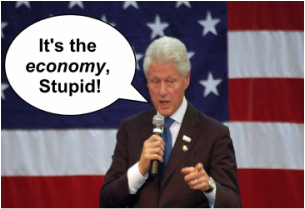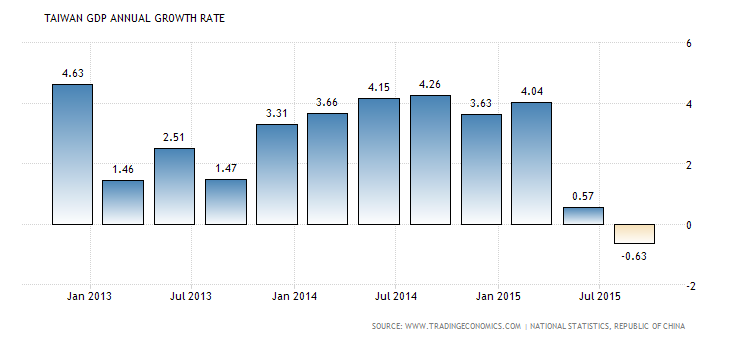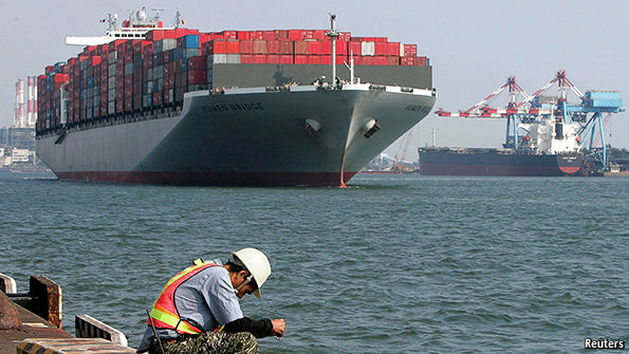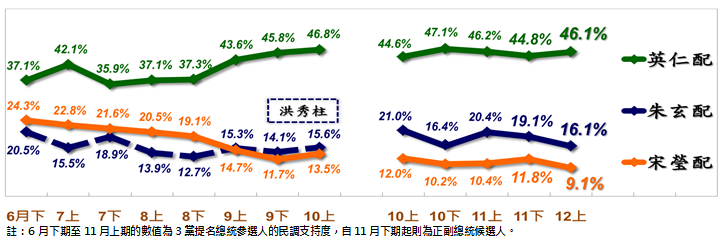So what do I mean by bread and butter issues? Well, the commentary linked above is focused mostly on the concerns about income and wealth distribution that have been salient for a while and have gotten a lot of press in recent years. But in addition, there's something much more recent and fundamental working against the KMT right now: the economy is just not doing very well. Here's a sample of the (English-language) economic news reports coming out of Taiwan over the last few months:
Taiwan is in a recession, and it's China's fault -- Forbes (December 1)
Weaker growth exposes downsides of China ties -- The Economist (November 14)
Industrial production falls 15% -- Taipei Times (November 20)
Unpaid leave hits 3-year high -- Taipei Times (November 17)
Taiwan nears recession, exports to China slump -- (October 31)
Taiwan exports in decline -- Voice of America (October 16)
GDP growth forecast cut to below 1% -- FocusTaiwan (October 15)
Tax revenue falls by 14.3% over previous year -- Taipei Times (October 13)
Rising pessimism about economy -- China Post (October 12)
TISR poll: 81% believe economy in bad shape -- via Solidarity.tw (September 14)
TAIEX suffers worst-ever one-day drop -- Taipei Times (August 25)
What all that reporting is trying to say can be summed up succinctly by the chart at the top of this page: Taiwan's economy is now rather suddenly headed into a recession, if it's not already in one. And that makes this a terrible moment to be running as an incumbent party.
 Say it, Bill
Say it, Bill I should note that the evidence for this effect and its size varies a lot across countries, and the sometimes puzzling variation in the size of economic effects remains an open area of inquiry in political science.
For instance, when the government is supported by a coalition of several parties, it's harder for voters to figure out which members deserve the blame for bad performance. The lack of a credible alternative to the incumbent--an opposition party or candidate who appears likely to do better--also leads to a weaker effect. (The opposition to the LDP in Japan has long struggled with a credibility problem, for instance.) And sometimes it's clear to voters that governments don't have much influence at all over bad economic outcomes because of global factors beyond their control, so they are less likely to punish incumbents at the ballot box.
In addition, voters turn out to have really short memories (i.e. they're "myopic," in the jargon of the discipline): the performance of the economy over the last six months matters a great deal more than the performance over a government's whole term in office. This is probably why the Conservatives in Britain, for instance, recently won re-election after presiding over an austerity-induced downturn during much of their first term.
Nevertheless, the basic claim, that economic downturns motivate voters to vote out incumbent governments when they can, is quite robust. In the United States, in fact, the state of the economy in the few months before a presidential election appears to be the single most important factor in who wins, more than the candidates themselves, their parties' policy platforms, or their campaigns.
- A long tradition of "stewardship" of the economy by the central government, dating back to the early martial law era, so the incumbent party at the national level is assumed to have significant responsibility for economic performance;
- The presidency and legislature have been controlled by the same party for the last 7 years, so they can't escape blame;
- The economic slowdown appears linked to a slowdown in the PRC's economy--linkage which was deliberately and explicitly promoted by the incumbent government;
- The incumbent government has consistently made economic issues central to its policy platform;
- The incumbent government has made prominent, highly specific economic pledges--for instance, President Ma's 6-3-3 promise.
- The existence of a credible alternative to the incumbent--the DPP has previously held national office and is not a complete unknown or too looney to be taken seriously (and the bar for that is pretty low these days.)
Part of that was Hung's own shortcomings as a candidate, but once she was replaced by Eric Chu, the KMT should have seen a real bounce. It hasn't. Chu is now down around 20% in the polls. That's likely to go up somewhat as pan-blue voters come back to the fold, and there are
Some of this decline in the polls is undoubtedly self-inflicted--the fiasco with Hung and the presence of James Soong in a spoiler's role yet again could probably have been avoided. But even if Eric Chu had accepted the nomination back in March, and Soong hadn't joined the race, I still don't think this would be much of a contest right now. The reason is those economic figures: Chu is the standard-bearer for a party that in voters' eyes is squarely to blame for this economic downturn, and they're going to have a chance in less than three weeks to weigh in.
Tsai Ing-wen is not Ma Ying-jeou or the KMT, and in these circumstances that looks like all she needs to win a comfortable victory. Cross-Strait policy, debate performances, campaign promises, VP selections--none of it is going to matter. In this election, it really is about the economy.



 RSS Feed
RSS Feed
